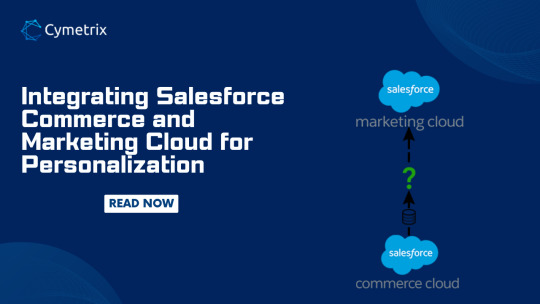#Commerce Cloud Market
Text
The global commerce cloud market is experiencing growth due to factors such as growing proliferation of smartphones, the increase in the growth of e-commerce industries in several countries and the growing adoption of cloud computing solutions
0 notes
Link
0 notes
Link
0 notes
Link
0 notes
Link
#fortune business insights#commerce cloud market#commerce cloud market size#commerce cloud market share#commerce cloud industry
0 notes
Text
Exploring Salesforce Commerce Cloud
In today's digital world, selling online has become a necessity for businesses of all sizes. To thrive in this competitive landscape, companies need powerful tools to manage their online stores efficiently. One such tool that stands out is Salesforce Commerce Cloud. In this article, we'll break down what Salesforce Commerce Cloud is, its key features, why it's important, and which companies can benefit from using it.
Salesforce Commerce Cloud Definition:
Salesforce Commerce Cloud, also known as SFCC, is a comprehensive cloud-based platform designed to help businesses build and manage their online stores effectively. It provides a range of features and tools that enable companies to create personalized shopping experiences, streamline operations, and drive sales across various digital channels
Features of Salesforce Commerce Cloud:
Unified Commerce:
SFCC offers a unified approach to commerce by integrating multiple channels such as web, mobile, social, and physical stores into a single platform. This allows businesses to provide consistent and seamless experiences to their customers regardless of the channel they choose to engage with.
2. Personalization:
One of the standout features of SFCC is its ability to deliver personalized experiences to shoppers based on their preferences, past purchases, and browsing behavior. This personalized approach helps businesses enhance customer satisfaction and drive conversions.
3. Omnichannel Capabilities:
With SFCC, companies can easily manage inventory, orders, and customer data across various touchpoints, ensuring a cohesive shopping experience across all channels.
4. Scalability and Flexibility:
Whether you're a small startup or a large enterprise, SFCC offers scalability and flexibility to meet your evolving business needs. It can handle high volumes of traffic and transactions without compromising performance.
5. Marketing and Merchandising Tools:
SFCC provides powerful marketing and merchandising tools that enable businesses to create targeted campaigns, optimize product placements, and drive engagement with customers.
Importance of Salesforce Commerce Cloud:
Enhanced Customer Experience:
SFCC empowers businesses to deliver personalized and seamless shopping experiences, leading to increased customer satisfaction and loyalty.
2. Efficiency and Productivity:
By centralizing operations and automating various tasks, SFCC helps businesses streamline their processes, reduce manual effort, and improve overall efficiency.
3. Data-Driven Insights:
SFCC offers robust analytics capabilities that provide valuable insights into customer behavior, sales performance, and market trends. This data-driven approach enables businesses to make informed decisions and optimize their strategies for better results.
4. Competitive Advantage:
In today's competitive landscape, having a strong online presence is essential for success. SFCC equips businesses with the tools and capabilities they need to stay ahead of the competition and drive growth.
Which Companies Should Use Commerce Cloud:
SFCC is ideal for companies across various industries that are looking to establish or enhance their online presence. It caters to businesses of all sizes, from startups to large enterprises, and can be particularly beneficial for:
Retailers: Whether you're selling fashion, electronics, or groceries, SFCC provides the tools you need to create compelling online storefronts and drive sales.
2. Brands: SFCC enables brands to connect directly with consumers and create immersive shopping experiences that reflect their unique identity and values.
3. B2B Companies: SFCC also caters to B2B businesses, helping them streamline their digital commerce operations and provide a seamless purchasing experience for their customers.
4. Manufacturers: Manufacturers can use SFCC to sell their products directly to consumers or through distributors, expanding their reach and driving revenue.
Conclusion:
Salesforce Commerce Cloud is a powerful platform that empowers businesses to thrive in the digital age by providing the tools and capabilities needed to build, manage, and optimize online stores effectively. With its focus on personalized experiences, omnichannel capabilities, and data-driven insights, SFCC offers a competitive edge to companies across various industries. Whether you're a retailer, brand, B2B company, or manufacturer, SFCC can help you drive growth, enhance customer satisfaction, and stay ahead of the competition in today's dynamic marketplace.
0 notes
Text
Streamlining Success: A Guide to Automating Your Business
In a world driven by technology, the key to unlocking efficiency and scalability lies in automation. Automating various aspects of your business not only saves time but also reduces the risk of errors and allows you to focus on strategic decision-making. In this blog post, we’ll explore how you can automate your business processes for enhanced productivity and growth.
1. Embrace Cloud-Based…

View On WordPress
#Business Automation#Cloud Solutions#CRM Software#E-commerce Automation#Efficiency#Financial Automation#Marketing Automation#Productivity.#Scalability#Zapier
0 notes
Text
0 notes
Text
Navigating the Digital Realm: The Viability of Businesses Without Physical Locations
Embracing the Digital Shift: Thriving in a Location-Independent Business Era
In today’s digital age, the question arises: Can your business not only survive but thrive without a physical location? The answer is a resounding yes. Explore the possibilities and advantages of steering your business towards a location-independent model in our interconnected world.
Embracing the Digital Landscape
1.…

View On WordPress
#cloud-based solutions#cost savings#digital business#digital marketing#e commerce#location-independent#online presence#remote work#scalability#virtual customer support
0 notes
Text
#salesforce#cloud#salesforce sales cloud#salesforce commerce cloud#salesforce marketing cloud#salesforce cloud#salesforce consulting partner#cloud consultants#salesforce crm#salesforce service cloud
0 notes
Text
INTEGRATING SALESFORCE COMMERCE AND MARKETING CLOUD FOR PERSONALIZATION

Nowadays, customers expect to see relevant content, offers, and recommendations that match their preferences, needs, and interests. But how can you achieve personalization at scale across multiple channels and touchpoints?
The answer is by integrating Salesforce Commerce Cloud and Marketing Cloud, two powerful platforms that work together to create personalized customer journeys. By integrating Salesforce Commerce Cloud and Marketing Cloud, you can create a unified customer view, deliver personalized content and offers, and optimize your marketing performance. You can also benefit from the scalability, security, and reliability of the Salesforce platform.
If you want to learn more, read the full blog post here.
#integrating salesforce commerce cloud for personalization#integrating marketing cloud for personalization#salesforce#commerce cloud#marketing cloud#personalization
0 notes
Text
SEO for SaaS companies
Maximizing Your VisibilityA Comprehensive Guide to SEO for SaaS Companies
Software as a Service (SaaS) companies operate in a highly competitive digital landscape. With so many companies vying for customers’ attention, it’s essential to have a robust search engine optimization (SEO) strategy to stand out from the crowd. In this article, we’ll cover everything you need to know about SEO for SaaS…

View On WordPress
#How to measure SaaS SEO success#SaaS SEO case studies#SaaS SEO for artificial intelligence (AI) technology#SaaS SEO for cloud-based businesses#SaaS SEO for e-commerce businesses#SaaS SEO for social media platforms#SaaS SEO vs PPC#SEO for SaaS Companies with Dhrubo Organization#SEO trends for SaaS companies#The future of SaaS SEO and its impact on businesses#The importance of content marketing for SaaS SEO
0 notes
Link
0 notes
Text
The Advantages and Challenges of Adopting Software as a Service (SaaS) in Modern Business Operations
Software as a Service (SaaS) is a cloud-based software delivery model where software applications are hosted and maintained by a third-party provider and made available to users over the internet. SaaS is one of the most popular cloud computing service models, and it has gained traction in recent years due to its scalability, cost-effectiveness, and ease of use.
In this article, we will explore…

View On WordPress
#accounting software#business software#Cloud Computing#cloud storage#collaboration software#customer relationship management software#e-commerce platform#email marketing software#human resources software#productivity software#project management software#SaaS adoption#SaaS benefits#SaaS challenges#SaaS market#SaaS pricing#SaaS providers#SaaS security#SaaS solutions#SaaS trends#software as a service#technology
1 note
·
View note
Text
Transforming E-commerce Operations with Salesforce Commerce Cloud Consulting Services: A Comprehensive Study
Latest Study on Industrial Growth of Salesforce Commerce Cloud Consulting Service Market 2023-2028. A detailed study accumulated to offer Latest insights about acute features of the Salesforce Commerce Cloud Consulting Service market. The report contains different market predictions related to revenue size, production, CAGR, Consumption, gross margin, price, and other substantial factors. While emphasizing the key driving and restraining forces for this market, the report also offers a complete study of the future trends and developments of the market. It also examines the role of the leading market players involved in the industry including their corporate overview, financial summary and SWOT analysis.
Get Free Exclusive PDF Sample Copy of This Research @ https://www.advancemarketanalytics.com/sample-report/188388-global-salesforce-commerce-cloud-consulting-service-market#utm_source=DigitalJournalVinay
Major players profiled in the study are:
Astound Commerce Corporation (United States), Coastal Cloud (United States), SevenPoints(United States), Algoworks (United States), Chetu (United States), Americaneagle (United States), e-Zest Solutions (India), Emizentech (India), Fexle.(India), Bacancy (India), Mindtree (India), Atlantic Technologies Spa (Italy), BORN Group. (United States), Ciberspring (United States), Dazeworks Technologies (India), Encaptechno (United States), LiveArea (United States), Abelian (United States),
Scope of the Report of Salesforce Commerce Cloud Consulting Service
Salesforce Commerce Cloud is a cloud-based commerce platform. It consist of various essential tools and portals which are especially useful for ecommerce platforms. This cloud allows to streamline purchasing process and customised personalisation of buying experience. This consulting services offers broad arrays of unique sets to create mobile friendly shopping experience. Owing to such ability to offer unified buying experience across mobile, social, store and web like channels, the demand for salesforce commerce cloud consulting service has been raised. Further increasing adoption of e-commerce platforms for conducting B2B & B2C operations created lucrative growth opportunities for the market.
In October 2021, Astound Commerce Launches Value Exchange Index Dashboard with including 100 metrics. This dashboard is mainly for measuring brand performance across digital commerce touchpoints. It involve auditing real time data from more than 50 major brands. With this launch, company is able to evaluate buying cycle of top brands from their initial product search to purchase.
The Global Salesforce Commerce Cloud Consulting Service Market segments and Market Data Break Down are illuminated below:
by Type (B2B, B2C), Application (Gift Card Activities, Front End Design Updates, Pricing & Catalogue Management, GTM Activities, Others), Industry Vertical (Retail & E-commerce, BFSI, IT & Telecom, Healthcare, Education, Others), Offering (Storefront Designed Tools, Product Content Management & Configuration, Performance Analytics, Others), Service (Managed Services, Implementation Services, -Integration to Sales Cloud, -Integration to service Cloud, -Integration to Marketing Cloud, Support Services, Others)
Market Opportunities:
Growing Adoption of Salesforce Commerce Cloud Consulting Services across BFSI sector
Augmenting Attention on Globalising Storefronts with Salesforce Commerce Adoption
Market Drivers:
Rising Industrial Expenditure of E-commerce and Retail
Increasing Demand for Predictive Intelligence via Salesforce Einstein AI
Market Trend:
Technological Advancements in Business Automations and Processing’s
What can be explored with the Salesforce Commerce Cloud Consulting Service Market Study?
Gain Market Understanding
Identify Growth Opportunities
Analyze and Measure the Global Salesforce Commerce Cloud Consulting Service Market by Identifying Investment across various Industry Verticals
Understand the Trends that will drive Future Changes in Salesforce Commerce Cloud Consulting Service
Understand the Competitive Scenarios
Track Right Markets
Identify the Right Verticals
Region Included are: North America, Europe, Asia Pacific, Oceania, South America, Middle East & Africa
Country Level Break-Up: United States, Canada, Mexico, Brazil, Argentina, Colombia, Chile, South Africa, Nigeria, Tunisia, Morocco, Germany, United Kingdom (UK), the Netherlands, Spain, Italy, Belgium, Austria, Turkey, Russia, France, Poland, Israel, United Arab Emirates, Qatar, Saudi Arabia, China, Japan, Taiwan, South Korea, Singapore, India, Australia and New Zealand etc.
Have Any Questions Regarding Global Salesforce Commerce Cloud Consulting Service Market Report, Ask Our Experts@ https://www.advancemarketanalytics.com/enquiry-before-buy/188388-global-salesforce-commerce-cloud-consulting-service-market#utm_source=DigitalJournalVinay
Table of Contents
Global Salesforce Commerce Cloud Consulting Service Market Research Report
Chapter 1 Global Salesforce Commerce Cloud Consulting Service Market Overview
Chapter 2 Global Economic Impact on Industry
Chapter 3 Global Market Competition by Manufacturers
Chapter 4 Global Productions, Revenue (Value) by Region
Chapter 5 Global Supplies (Production), Consumption, Export, Import by Regions
Chapter 6 Global Productions, Revenue (Value), Price Trend by Type
Chapter 7 Global Market Analysis by Application
Chapter 8 Manufacturing Cost Analysis
Chapter 9 Industrial Chain, Sourcing Strategy and Downstream Buyers
Chapter 10 Marketing Strategy Analysis, Distributors/Traders
Chapter 11 Market Effect Factors Analysis
Chapter 12 Global Salesforce Commerce Cloud Consulting Service Market Forecast
Finally, Salesforce Commerce Cloud Consulting Service Market is a valuable source of guidance for individuals and companies.
Read Detailed Index of full Research Study at @ https://www.advancemarketanalytics.com/buy-now?format=1&report=188388#utm_source=DigitalJournalVinay
Thanks for reading this article; you can also get individual chapter wise section or region wise report version like North America, Middle East, Africa, Europe or LATAM, Southeast Asia.
Contact Us:
Craig Francis (PR & Marketing Manager)
AMA Research & Media LLP
Unit No. 429, Parsonage Road Edison, NJ
New Jersey USA – 08837
#Salesforce Commerce Cloud Consulting Service Market Analysis#Salesforce Commerce Cloud Consulting Service Market Forecast#Salesforce Commerce Cloud Consulting Service Market Growth#Salesforce Commerce Cloud Consulting Service Market Opportunity#Salesforce Commerce Cloud Consulting Service Market Share#Salesforce Commerce Cloud Consulting Service Market Trends
0 notes
Text
Mobile App Development Services & Business of Apps
Mobile app development is the process of creating software applications that are specifically designed to run on mobile devices such as smartphones and tablets. In recent years, mobile devices have become the primary way in which people access the internet and consume digital content. As a result, mobile app development has become a crucial part of the software industry.
There are two primary approaches to mobile app development: native app development and hybrid app development.
Native app development involves creating apps specifically for a particular mobile platform, such as iOS or Android. This approach allows developers to take full advantage of the features and capabilities of the platform, resulting in a more seamless and optimized user experience.
Hybrid app development involves creating apps that are designed to run on multiple platforms using a single codebase. This approach can be more cost-effective and efficient, as developers do not need to create separate versions of the app for each platform.
Regardless of the approach taken, there are several key steps involved in mobile app development. These include:
Idea generation: The first step in mobile app development is to come up with an idea for the app. This could be based on a specific need or problem, or it could be a new and innovative concept.
Planning and design: Once the idea has been finalized, developers need to plan out the functionality and design of the app. This involves creating wireframes and mockups of the user interface, as well as identifying the key features and functionality of the app.
Development: The development phase involves writing the actual code for the app. This can be done using a variety of programming languages and tools, depending on the platform and approach being taken.
Testing: Once the app has been developed, it needs to be thoroughly tested to ensure that it functions correctly and is free of bugs and other issues. This typically involves a combination of manual testing and automated testing tools.
Deployment and maintenance: Once the app has been tested and is ready for release, it can be deployed to the relevant app stores or distribution channels. Ongoing maintenance and updates are also necessary to ensure that the app remains functional and up-to-date.
In addition to these core steps, mobile app development also involves a variety of other considerations, such as security, user privacy, and compliance with relevant laws and regulations.
Overall, mobile app development is a complex and multifaceted process that requires a high degree of skill and expertise. As the demand for mobile apps continues to grow, it is likely that this field will become increasingly important and competitive in the years to come.
#Application Development#Microsoft Applications#Mobile App Development#E-Commerce Web Development#Mobile app development#full stack development#System Integration#cloud services#Digital Marketing
0 notes